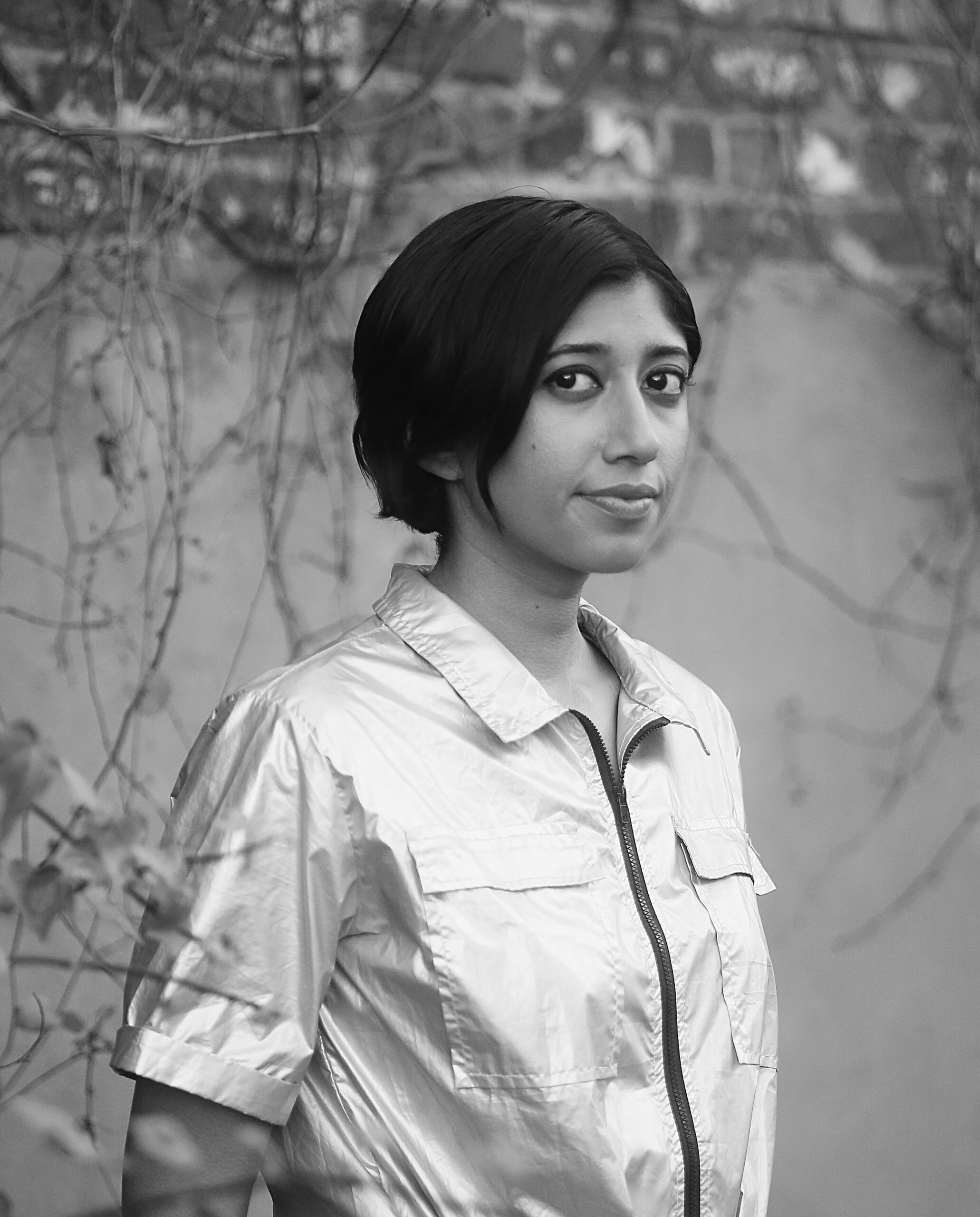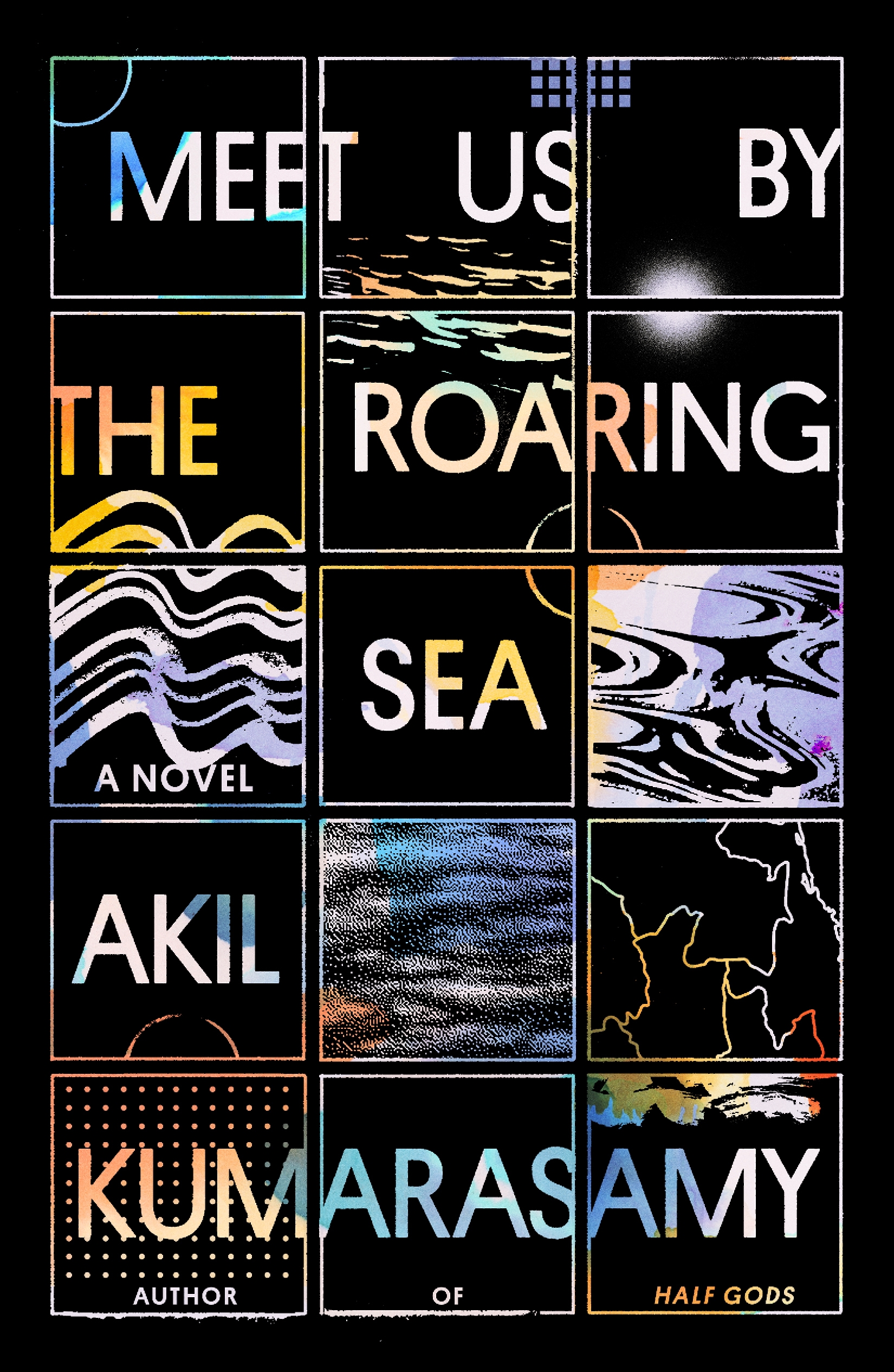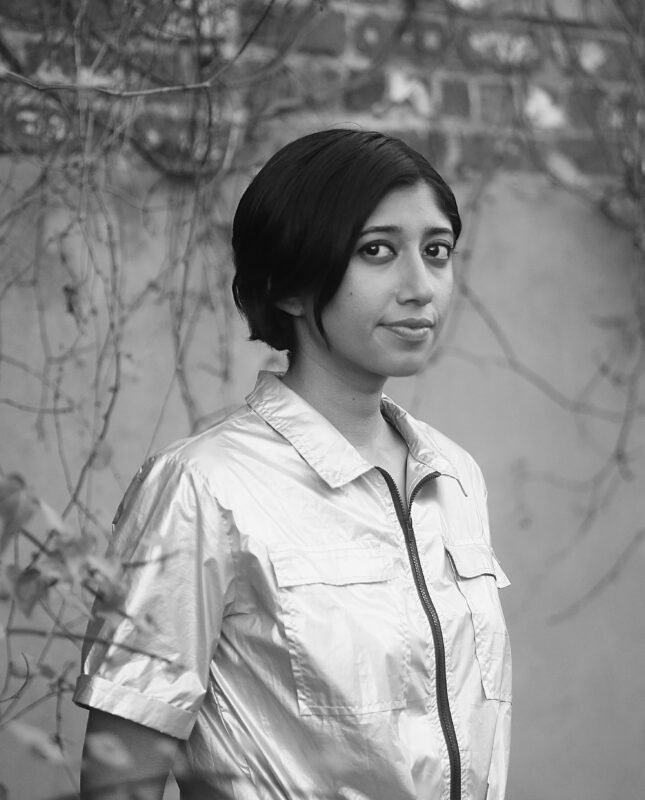

Akil Kumarasamy
Award-winning Author
Bard Fiction Prize


Readings &
Lecture Topics
-
Our Strange World: On Writing Surreal/Dystopian Literature
-
Writing about Violence and War
-
Short Story Collections like Mixtapes
-
Mapping New Geographies
- An Evening with Akil Kumarasamy
Biography
“Kumarasamy is also such an assured writer that you trust her completely, sentence by sentence.” —Los Angeles Times
“Kumarasamy writes with heart, wit, and an unflinching eye about the complexities of family, war, and finding one’s home.” —Sara Novic
“Akil Kumarasamy is a singular talent.” —Cathy Park Hong
Akil Kumarasamy is the author of the collection Half Gods (Farrar, Straus and Giroux, 2018), which was named a New York Times Editors’ Choice, awarded the Bard Fiction Prize and the Story Prize Spotlight Award, and was a finalist for the PEN/Robert W. Bingham Prize for Debut Short Story Collection. The linked story collection reveals with sharp clarity the ways that parents, children, and friends act as unknowing mirrors to each other, revealing in their all-too human weaknesses, hopes, and sorrows a connection to the divine.
Most recently, she is the author of the debut novel Meet Us by the Roaring Sea (Farrar, Straus and Giroux, 2022), which was shortlisted for the Ursula K. Le Guin Prize and Lambda Literary Award and selected as a New York Times Editors’ Choice. In the near future, a young woman finds her mother’s body starfished on the kitchen floor in Queens and sets on a journey through language, archives, artificial intelligence, and TV for a way back into herself. She begins to translate an old manuscript about a group of female medical students—living through a drought and at the edge of the war—as they create a new way of existence to help the people around them. In the process, the translator’s life and the manuscript begin to become entangled.
About the novel, Dana Dunham said: “Set in a future of eye scans, carbon credits and advanced AI, Akil Kumarasamy’s new novel nonetheless feels surprisingly like home—even as it tests the boundaries of self and story. Its protagonist, grieving the recent death of her mother, throws herself into translating a little-known Tamil manuscript about 17 medical students who strove to achieve radical compassion during the Sri Lankan Civil War (dating to 1983–2009). This and her other portals to shared experience—the omnipresent television, a new drug that transfers memories—dissolve the barriers of being into a dizzying alchemy of past and present, love and truth, death and memory.”
Kumarasamy’s work has appeared in Harper’s Magazine, The Atlantic, American Short Fiction, BOMB, and other publications. She has received fellowships from the University of East Anglia, the Fine Arts Work Center in Provincetown, Yaddo, and the Schomburg Center for Research in Black Culture.
She is an assistant professor in the Rutgers University-Newark MFA program and a 2024-25 fellow at the Harvard Radcliffe Institute. She lives in New York City.
Short Bio
Akil Kumarasamy’s debut novel, Meet Us by the Roaring Sea, was published by Farrar, Straus and Giroux in 2022, and was a New York Times Editors’ Choice, and shortlisted for the Ursula K. Le Guin Prize and Lambda Literary Award. Her linked short story collection, Half Gods, (FSG, 2018), was awarded the Bard Fiction Prize and the Story Prize Spotlight Award, and was a finalist for the PEN/Robert W. Bingham Prize along with a New York Times Editors’ Choice. Her work has appeared in Harper’s Magazine, The Atlantic, American Short Fiction, BOMB, among others. She has received fellowships from the University of East Anglia, the Fine Arts Work Center in Provincetown, Yaddo, Callie’s Berlin, and the Schomburg Center for Research in Black Culture. She is an assistant professor in the Rutgers University-Newark MFA program and a 2024-25 fellow at the Harvard Radcliffe Institute.
Visit Author WebsiteVideos
Publications
Meet Us By the Roaring Sea
Fiction, 2022
“For all that book’s prodigious skill and deft structure, readers of Half Gods will not be prepared for the uncanny brilliance of Kumarasamy’s first novel. Meet Us by the Roaring Sea is a masterpiece that more than confirms the promise of Half Gods. Kumarasamy is one of more exciting young fiction writers at work right now.” —Jonathan Russell Clark
“The best thing ever in the world of books.”—M.I.A.
In the near future, a young woman finds her mother’s body starfished on the kitchen floor in Queens and sets on a journey through language, archives, artificial intelligence, and TV for a way back into herself. She begins to translate an old manuscript about a group of female medical students—living through a drought and at the edge of the war—as they create a new way of existence to help the people around them. In the process, the translator’s life and the manuscript begin to become entangled.
Along the way, the arrival of a childhood friend, a stranger, and an unusual AI project will force her to question her own moral compass and sense of goodness. How involved are we in the suffering of others? What does real compassion look like? How do you make a better world?
Half Gods
Short Story, 2018
A startlingly beautiful debut, Akil Kumarasamy’s Half Gods brings together the exiled, the disappeared, the seekers.
Following the fractured origins and destines of two brothers named after demigods from the ancient epic the Mahabharata, we meet a family struggling with the reverberations of the past in their lives. These ten interlinked stories redraw the map of our world in surprising ways: following an act of violence, a baby girl is renamed after a Hindu goddess but raised as a Muslim; a lonely butcher from Angola finds solace in a family of refugees in New Jersey; a gentle entomologist in Sri Lanka discovers unexpected reserves of courage while searching for his missing son.
By turns heartbreaking and fiercely inventive, Half Gods reveals with sharp clarity the ways that parents, children, and friends act as unknowing mirrors to each other, revealing in their all-too human weaknesses, hopes, and sorrows a connection to the divine.
Articles & Audio
Read What’s In Print
• John Keene in conversation with Akil Kumarasamy – Brooklyn Rail
• Pushing Against the Self in Fiction: A Conversation with Akil Kumarasamy – LA Review of Books
• Nine of Our Favorite New Books from 2022 – Tricycle
• Wrapped inside a dystopian novel, an epic of ‘radical compassion’ – Los Angeles Times
• Longing for Things Just Out of Reach – New York Times
• The Haunting Undercurrent of Grief in Meet Us by the Roaring Sea – Chicago Review of Books
• Debut Stories Trace the Aftershocks of the Sri Lankan Civil War – New York Times
• Collection Explores Strife, Trauma, and “a Lifetime Loving Strangers” – The New Yorker
• Hope and Destruction: A Conversation with Akil Kumarasamy – The Margins
Listen to Audio
• Akil Kumarasamy on Memory, Technology, and the Cost of Caring for Others – LitHub
Selected Writings
• Read “Read the New World” from Half Gods by Akil Kumarasamy
A Way Beyond Mortality (excerpt from Meet Us by the Roaring Sea)
e were eighteen the summer of the drought. The cow’s milk tasted of water and the harvest had shriveled to half-formed things. Onions the size of chicken eggs were pulled from the ground, as were lentils the color of the sky, the same bright blue as the dye from the garment factory. At Saint Mary’s Hostel, we survived off boiled peanuts and rice porridge. That single meal was meant to last us the whole day. The hunger was a lesson in the human body, and on our first day of anatomy class we all looked drained and hollowed out like the skeleton hanging at the front of the room. Seventeen girl specimens.
Alone for the first time in our lives, we walked from the hostel to the canteen, our backs hunched and arms tight across our chests, and the older girls would look at us wordlessly while passing, their gaze like the steady surface of a mirror. We’d feel them willing us to look, step closer, reveal what we did not know of our true natures.
Sitting side by side, the older girls ate with a patience we had yet to fully understand. They chewed on a single peanut for twenty minutes, moving their mouths so slowly, as though they were chanting. Sometimes they left their porridge outside the gates for a street dog, or they searched for the hungry before sundown, walking barefoot down the streets. To us, it seemed like they survived on nothing at all.
We had come from different villages and cities across the state to the recently established medical college, only twenty-nine kilometers from the Island. Our parents were told we would get first-rate medical training because of the geography. How many first-year students were able to operate on patients? Our parents knew of the civil war on the Island, but with a distant recollection much like their memory of the old epic poetry we shared, written in the same tongue, when ancient kings ruled the land and nothing as elemental as water divided dynasties.
For them these were like fables, old wives’ tales, useless musings that brought only more hunger. We were mostly average students, who scored high enough to enter medical school but not enough for a government scholarship. With the opening of the medical college near the refugee camps, our parents prayed at the temple, the mosque, the church, thanking the Lord for the misfortune of others. As long as people suffered, we would be employed. When they spoke of the refugees, they expressed an oversaturated pity, their voices clotted with satisfaction, and before they could turn away, we saw the faint outline of a smile cross their lips, as if they found a dark-edged pleasure in the image of us holding knives and needles, poking and prodding with our young, inexperienced hands.
The refugee camps dotted the shoreline, and at night when we heard the ocean we could picture the kerosene lamps lighting square shanties, walls held together by the spit of longing. The third-year students told us that in their first year there was an epidemic of gangrene in the camps, and when they ran out of anesthesia, at least four girls needed to hold each patient as they stuffed cotton into their mouths, rubbed alcohol on their sickly limbs, and prayed as they cut down through the skin, scraping into the bone.
Some of us had never seen a dead body, but the older girls said we would be used to those soon enough. Out of every ten patients in emergency care, eight passed on, while two lived a little longer. Patients wanted one more day, a couple of weeks, some years, which is all a life really is anyway.
One afternoon we noticed a line scrawled in the margins of Sangeeta’s biochemistry textbook: “There’s a way beyond mortality.” It was a used book but we couldn’t find the name of any previous owner. Instead we studied each chapter, searching for answers, and at night we dreamed of that secret hatch in the body, the hidden route to salvation. The boys already believed themselves invincible. Instead of studying, they went diving for pearls, never returning empty-handed because luck was on their side, even if they brought back only seashells or a bottle of toddy. Perhaps fearlessness was the elixir to ward off death.
Our girls’ hostel was less than five hundred meters from the college but the boys’ hostel was much closer, practically adjoined. The boys woke only a few minutes before class and arrived red-eyed with their hair uncombed and in the same trousers they had worn for weeks, smelling again and again of yesterday. After class they ate quickly in the canteen, joking with us, savoring some crude line to forget their hunger.
At night they stayed out, sometimes jumping on an empty boxcar and following the tracks to another town. We watched as they howled through the evenings, their slim bodies alarming us with sensations of jealousy and the unknown as we returned to Saint Mary’s at curfew, with Madame Sarojini counting our names on the sign-in paper and checking our tardiness against the clock. A single old television with a knob and metal antlers waited for us in the common area, the floor covered with a green sheet where we sat side by side with our legs folded. On nights when the electrical current was out, we played games of rummy, passing the candle and holding the flame close to our faces, the hot wax dripping against our fingers as we glimpsed our cards and our features, all our doubts and worries, glowing in a brief flash visible to everyone, before we slipped back into dark anonymity. During one of these nights, the older girls told us that we needed to wake early, before sunrise. When we rose the next morning, we bumped into one another, still dreaming as we stood in the courtyard in our nightgowns while the senior student Baseema looked us over. “You’re going to need to separate yourselves from your egos,” she said, and looking at one another—tall, short, fat—the sun slowly blinding us to the world above us, we saw our shadows spread across the dirt in a single black mass.
Radical compassion was what the older girls called it. We were practicing to become not only doctors but saviors, bodhisattvas who were drawn to suffering and embraced it. Above the doorway of the second-floor hall was a quote by Kahlil Gibran, painted in thick cursive: “Your pain is the breaking of the shell that encloses your understanding. . . . It is the bitter potion by which the physician within you heals your sick self. / Therefore trust the physician, and drink his remedy in silence and tranquility.” Madame Sarojini would walk under those words every day, never lifting her head. How much of the world went unnoticed by us?
We exchanged class schedules, pretending to be one another. Sonya was Parvati, Radha was Urvashi. Anatomy traded for organic chemistry, and entomology swapped for another animal equivalent like ornithology. At first our professors didn’t even notice that we were becoming one another. Only after Avvaiyar required that we speak in pure Tamil three times a week (Mondays, Wednesdays, Thursdays) did the professors look at us like we were a pack of imbeciles, as we replied to their questions in a manner we imagined our kings, warriors, and saints must once have. We were sent one by one to the dean, who couldn’t get a handle on our names, which we kept changing, slipping further and further away from ourselves. “English only, please,” he demanded as we explained how the refugees spoke pure Tamil, unlike ours, which was all mixed with English, and he rubbed his head, placing two fingers against his closed eyelids as if to correct his vision.
We were learning two different systems of knowledge, one structured by a clinical understanding of the body and the other ancient, known before knowing. At night we congregated in the common area and turned on the television, black-and-white static lines chopping up the screen along with the music. We weren’t really watching, but listening to one of the older girls, either Baseema, Avvaiyar, or Leela, speak in a soft whisper, all the while straining our ears because we knew what was spoken dug below the surface of this world. There was much suffering and dying everywhere, and we needed to reach a new consciousness to be of any use. Regular medical training would not be enough. “Like Siddhars living in the forest, half naked, turned inward so deeply we will uncover enlightened perfection, but unlike the Siddhars, we will circulate ourselves among the people. They will be our forest, our shelter,” Avvaiyar said, and we felt a sudden fear of being apart from this world and vulnerable to it.

